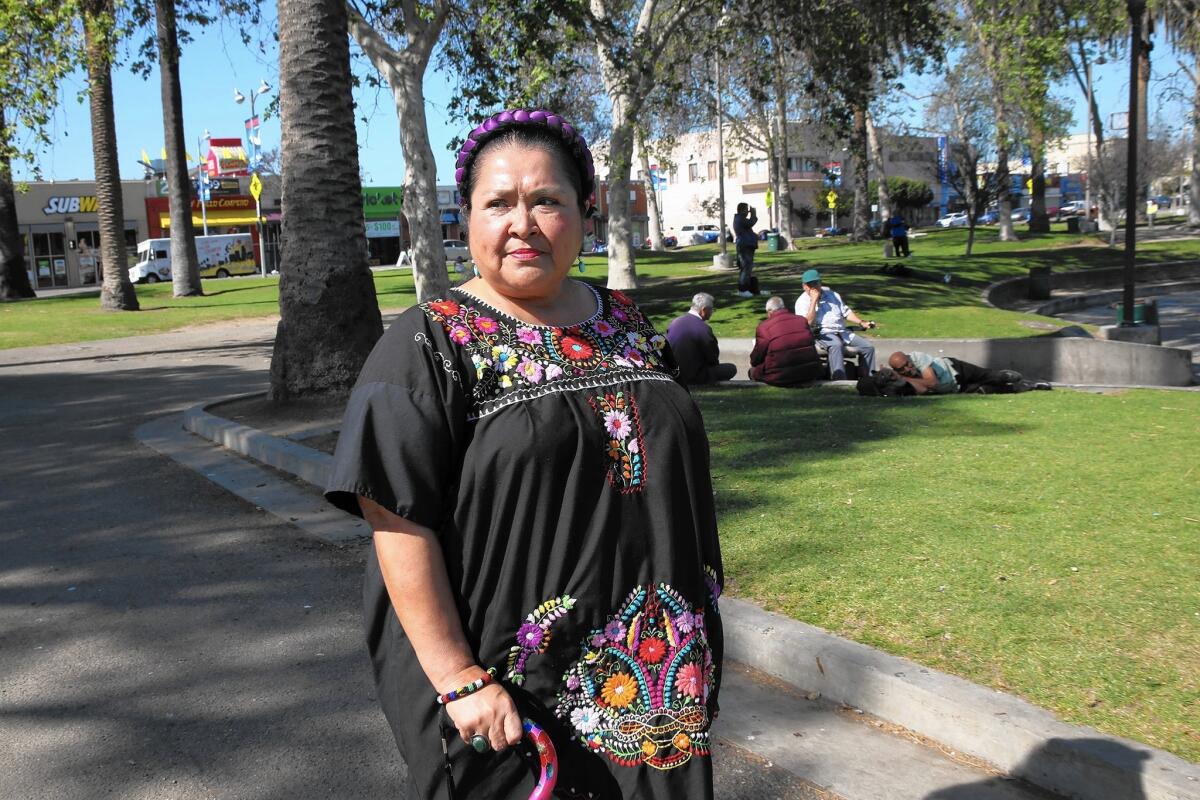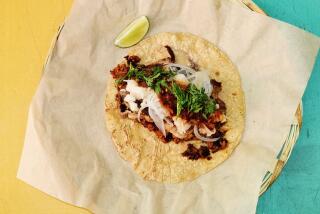‘Mama’ of Mama’s Hot Tamales made a name for herself, now protege won’t let her use it

The name “Mama” was given to Sandra Romero like a job title, back when she first began working in MacArthur Park.
In a neighborhood plagued by gangs, drugs and lawlessness, it took Romero more than a decade to earn the respect that came with such a moniker.
It was 2001 and through Mama’s Hot Tamales, a nonprofit restaurant backed by the city, Romero’s job was to clean up the park and to teach the street vendors flooding the area how make a living — legally.
Over the years, hundreds of vendors gave up their sidewalk peddling to become her students. They trained in her kitchen and transformed their lives through the program. Some launched their own restaurants, food trucks and farmers market stands. A few managed to have their products picked up by grocery stores, such as Whole Foods.
Mama, a charismatic woman with colorful Mexican dresses and braided hair, became an anchor in the neighborhood, and her cafe was ground zero for activists, academics, politicians and police who were pushing to improve the area.
Today, Romero lives just blocks away, but won’t go near the little restaurant with the blue awning. She hardly looks in that direction, just across the street from the park. She’s also careful to never use the Mama’s Hot Tamales name — on her Facebook, email or business card.
If she does, she says, Rocio Ramirez, one of the many women she mentored over the years, could hit her with a lawsuit.
Ramirez, once a star student, took the trademarked name a while back and through a lawyer, is forbidding her from using it, Romero says.
“It’s something I would have never imagined. Mama’s Hot Tamales stood for hope, change, love — everything we experienced in the neighborhood. It was my reputation.”
Ramirez, who is now running the restaurant, says the trademark had expired long ago and was legally up for grabs.
“It was abandoned for so long that anyone — you, me, a neighbor, another business — could have taken it,” she said.
The story of the two women began when Romero came to MacArthur Park from Pasadena in 1998.
She and her business partner, Joe Colletti, launched the Institute for Urban Research and Development to help impoverished areas.
Colletti convinced Romero that MacArthur Park was an ideal place to start.
Built in the 1880s, the park had once been considered the “Champs-Elysees of Los Angeles.” Tourists flocked to the surrounding luxury hotels and the small, spring-fed lake at its center was filled with row boats.
By the 1980s, trash littered the gopher-hole pocked lawn, graffiti covered the amphitheater, prostitutes worked the restrooms and gangs such as the “Locos” occasionally triggered deadly gunfights. Men sold fake IDs on every corner, and now and then, the coroner pulled bodies from the lake.
Romero was overwhelmed.
“It was a no-man’s land,” she said. “I kept asking, Joe, ‘Where is the police?’”
Romero zoomed in on the street vendors illegally selling chips, drinks and other food. She convinced them to sell from permitted carts lining the park. There, police wouldn’t cite them and renting a cart cost only $1 per year.
Later, with the city’s permission, the vendors transformed the carts into tamale stations — selling tamales from all regions of Latin America. Romero opened a kitchen and restaurant to teach her students health standards, permitting rules and customer service. They called the program Mama’s Hot Tamales. Colletti anointed Romero the “Mama.”
Romero kept busy growing her program, at the cafe or out on the grass. She built an impressive roster of connections with local groups and at City Hall, chased away gangsters who tried to tax her vendors, organized clean-ups, had video cameras installed and helped launch art installations and summer concerts.
When police wielded batons and fired rubber bullets during a mostly peaceful immigration protest at MacArthur Park in 2007, Romero and the city tried to ease tensions by hosting an event. Her students proudly presented their contribution: an 18-foot “peace tamale” wrapped in banana leaf.
“Everybody knew Sandi,” said Rocio Veliz, youth program coordinator with Carecen, an immigrant rights organization. “After she began investing in the neighborhood, an army of people formed around the park to help.”
Rocio Ramirez, a single mother of three who used to sell cacti and chorizo from a street cart in Boyle Heights, was among the first students in Romero’s program.
She was driven from the start. Romero watched with pride as her protege’s tamale sales helped her support her family, become a citizen and buy a house.
Eventually, Ramirez became a mentor to other students. Romero liked to nudge her out in front of the reporters and photographers who came to report on Mama’s Hot Tamales’ success.
“I used to always tell people, ‘This is Rocio, one of my stellar students,’” Romero said.
In 2011, a decade after launching Mama’s, Romero was diagnosed with Stage 4 breast cancer. She wanted to spend more time with her family, so reluctantly, she decided to close the program.
She and Colletti transferred the lease of the cafe space to her top student: Ramirez.
They made one request: Please operate under a different name. Ramirez chose Mama’s International Tamales.
“At the time, we weren’t sure what the future held,” Romero said.
She had no plans to return to the cafe, but the Mama’s Hot Tamales name had wide recognition and she and Colletti wanted to reserve it for potential use in other projects. That included selling products in grocery stores.
During her recovery, Romero said, she had little contact with Ramirez other than stopping by the restaurant one day to remove all of her framed awards and recognitions. She also removed a giant mural featuring the Mama’s logo.
Then, last fall, she received a cease-and-desist letter from an attorney representing Ramirez. Another letter came in December. The notices demanded that Romero stay away from the name Mama’s Hot Tamales.
It turns out that the name’s trademark, long owned by Romero and Colletti, had indeed expired in 2011, the year Romero got sick. Ramirez is in the process of securing all the rights to the name, under a new umbrella company she’s formed called Mama’s Food Mexico.
Romero said she reached out to her former student, but the conversation resolved little.
At the new Mama’s Hot Tamales on West 7th Street, Ramirez runs the restaurant with help from a partner.
She splits her time between Los Angeles and Los Cabos, Mexico, where she said she’s trying to launch a training program similar to Romero’s.
Speaking by phone from Los Cabos recently, she said she doesn’t recall having any disagreements with Romero.
“I would never disrespect Sandi,” she said. “She’s a very special person.”
Ramirez said her partner, Carlos Fernandez, is the one who decided to trademark Mama’s Hot Tamales. The attorney handling the transfer of trademark, Carolina Marin-Henriquez of Long Beach, however, says she was hired by Ramirez.
Ramirez says her goal is to see Mama’s Hot Tamales sold in grocery stores nationwide. She’s also working with locals in Los Cabos to have the products they make, such as salad dressing and candy, imported to stores in the United States.
Ramirez rejects the idea that she may be capitalizing off of someone else’s hard work.
She says she’s been part of the tamale project from its earliest days.
“I’m Mama,” she said.
As for Romero, she recovered from cancer and is easing back into neighborhood activism. Her husband wants her to fight and take back the name, but Romero would rather move on with her life.
“I was hurt and shocked,” she said. “But it’s time to let it go with grace, not with ugliness and fighting.”
In the neighborhood, she’s still known to everyone as Mama. Many are rooting for her success.
“There’s a strength to her that is genuine, and no one can take that away from her,” said Ed Reyes, who worked for years with Romero when he was the City Council member for the area.
Romero recently adopted a new name: Mama’s Merging Markets.
She and Colletti want to branch out to different neighborhoods and organize events and programs promoting art, music and culture.
“We want to bring Mama out to the community,” Colletti said.
Tamales, of course, will remain a part of the mix, including in Romero’s catering business, which carries a wide selection of her many variations on the masa-based staple.
For now, Romero has again turned her attention to MacArthur Park, which is struggling once more with increased crime and homelessness.
“A lady came up to me the other day and told me she won’t go to the park because she’s afraid,” Romero said. “It broke my heart.”
“This means that this time around, I need to roll up my sleeves even higher.”
esmeralda.bermudez@latimes.com
More to Read
Sign up for Essential California
The most important California stories and recommendations in your inbox every morning.
You may occasionally receive promotional content from the Los Angeles Times.










